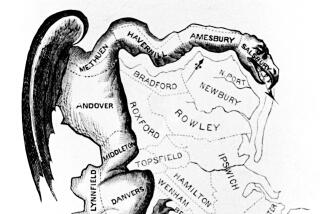Deciphering the Evolution of Devolution
There are no easy answers when it comes to government decentralization, an economics professor said Saturday.
Eleanor Brown, an associate professor at Pomona College, outlined what state and local governments may expect as Congress continues to shift programs from the federal to the local level.
Brown’s remarks came during a weekend conference in Oxnard staged to give journalists a better perspective on the flurry of complex problems associated with government decentralization, sometimes called devolution.
As an example, Brown cited the welfare reform effort, which lately has been a particularly prickly issue in California.
Last year, Congress amended the 61-year-old program instituted by President Franklin D. Roosevelt as part of his New Deal. Instead of paying welfare recipients directly, the government now delivers block grants to states, which will determine how best to administer the money.
But, according to Brown, that has caused some difficulties.
“It’s a very hard question,” Brown said. “Welfare is the type of service that fits both federal and local responsibility.”
Brown said that, on the one hand, because the needs of welfare recipients vary from region to region, states are in a better position to determine how the money can best be used and can tailor their programs as necessary.
On the other hand, welfare demands a sizable chunk of funding and, therefore, could be kept as a federal program. While the federal government will subsidize most of it, states must also reach into their coffers to pay for it. And for cash-strapped states like California, that’s where devolution becomes problematic.
But those problems aren’t confined to the welfare debate. They are recurrent themes in other issues, such as transportation, environmental protection and health care, Brown said.
While Brown insisted that a government crisis isn’t a foregone conclusion, she said that the changes will be painful and difficult for local governments.
“When you think about these issues, you’ve got all these little things going on that are very hard to resolve,” she said. “It’s important that we recognize them.”
The weekend conference, sponsored by the Foundation for American Communications, is aimed at giving journalists the knowledge to accurately report on government trends in hopes of finding better, more equitable, solutions.
More to Read
Sign up for Essential California
The most important California stories and recommendations in your inbox every morning.
You may occasionally receive promotional content from the Los Angeles Times.










